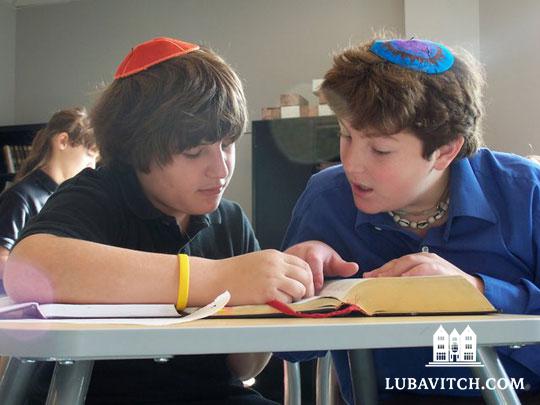(lubavitch.com) An international group of Jewish teachers is setting out to change how Torah is taught, and if you can wiki, you can join them.
Tools for Torah, the brainchild of Chabad-Lubavitch representative Rabbi Chayim Boruch Alevsky, is using a wiki platform to reinvent how day school teachers, yeshiva educators and homeschoolers transmit the lessons of the Five Books of Moses or, in colloquial Hebrew, Chumash.
“Wikis” are the stone soup of online document writing. All group members contribute, adding flavor and dimension of the final document. Wikipedia, the online mega encyclopedia created and refined by web savvy users, is perhaps the best-known wiki site.
By using a wiki platform, Tools for Torah allows educators from around the world to submit, comment on, change and adapt the teaching materials for their classrooms, for individual students. Tools for Torah (www.toolsfortorah.com) will be more than an outpost for sharing worksheets and craft ideas, however. Audio and video files developed or posted to TFT will add a dimension of learning that is absent in traditional paper-based study materials. Plans include programming that will allow teachers to track student progress and students to review classroom material online.
More revolutionary is how lessons on TFT will be structured. They will “go to the roots of why we teach Chumash,” Rabbi Alevsky told Lubavitch.com from his home in New York. After authoring a shelf full of Jewish teaching materials, spending fifteen years in the classroom, and with experience as Chabad of the West Side’s youth director, Rabbi Alevsky began to suspect that “students lack enthusiasm for the subject because their classroom experience has been more focused on covering mass amounts of content and skills rather than meaning and purpose.”
Currently, TFT developers – a group of 35 teachers so far – are at work on a unit that starts with the big questions surrounding the birth of Isaac and Esau. Using the TFT format, the lesson progresses from questions about the nature of evil to the skills needed to fish out Jewish perspectives on that issue from the words of the verses in Genesis.
While Jewish education has been singled out as the key to Jewish continuity in study after study, sermon after sermon, what goes on in the classroom has received less attention and less funding. But that is beginning to change. There is a growing push to bring greater sophistication and evidence-based teaching methods to the Jewish studies classroom.
Within the Chabad-Lubavitch movement there has been a proliferation of steps forward. Education conferences, accreditation processes specific to Jewish day schools, new approaches to Talmudic study have been developed by Chabad representatives over the last several years. Still in its infancy, Tools for Torah will eventually become part of the trend to invest more in improving classroom learning so Jewish kids not only stay Jewish, but also seek out Jewish growth, via study, as adults.
Malka Phillips, a teacher of second through eighth grade at Bais Menachem Hebrew Academy in Austin, TX, is counting on TFT to provide her with tools that are a given for secular studies teachers. “I spend an astronomical amount of time preparing for each class, now. This website will save me time and give me more ideas. All those brains are better than one.”
Some very choice brains are on board to guide TFT to keep the lessons’ quality high and focused on the “Why does this matter?” behind each chapter and verse.
TFT’s educational director Chana Silberstein, PhD, a developmental psychologist and Chabad’s representative at Cornell University, said this will be accomplished by using “Understanding by Design” format, a method that emphasizes structuring lessons by first identifying the desired outcomes, and letting those drive the skills and content covered in class.
“The key is to give children a reason to care about acquiring the skills they need to decipher the Hebrew text, because children engage in skill mastery in a context where acquiring those skills has been made personally important to them,” Mrs. Silberstein said.
Leading educators around the world are putting their experience to work for the Tools for Torah effort. Sara Rosenfeld, a Chabad representative in Melbourne, Australia, and a curriculum development specialist, has helped shape the format for TFT’s lessons. To her, one of the most appealing parts of the project is the use of the web-based environment.
“The idea of being able to collaborate with educators from around the world is exciting,” she said, explaining the benefits of putting classroom materials on the net. It’s a good hook for tech-mad students; it’s a money saver for teachers who wish to pick and choose a few lessons without committing to the purchase of an entire lesson package.
TFT is an idea whose time has come, according to Rabbi Levi Solomon, M.A., vice principal of Emek Hebrew Academy, one of Los Angeles’s largest Jewish day schools, told Lubavitch.com
“Too much of a teacher’s day is occupied with drilling translation, testing and moving on instead of uncovering the ‘why’ behind why we learn Torah,” said Rabbi Solomon.
Tools for Torah “will free up a teacher’s time to address the relevance of Torah as a living document, a blue print for their own lives.”

Be the first to write a comment.